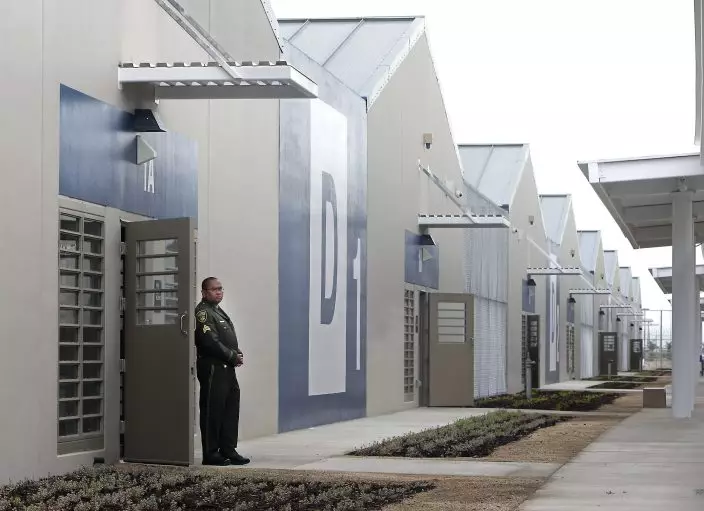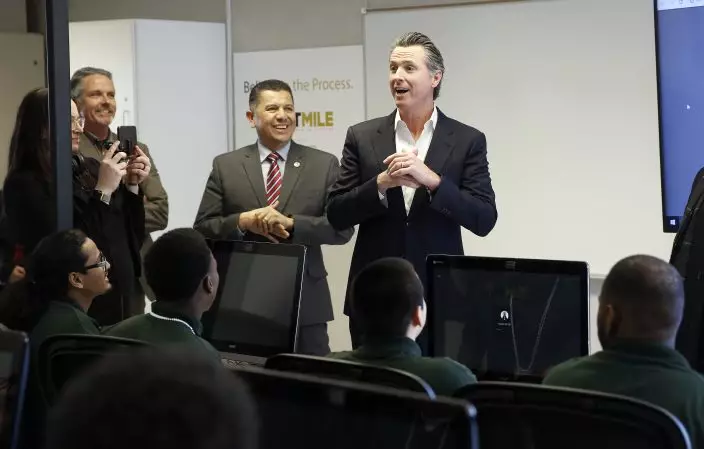Legionnaires' disease bacteria that killed one inmate and sickened another is more widespread than expected in a California state prison, officials said Wednesday, citing new test results.
Preliminary results found the bacteria in the water supply at a prison medical facility in Stockton and at two neighboring youth correctional facilities, Corrections Department spokeswoman Vicky Waters said.
Officials had thought it was isolated to one housing unit where the two inmates lived. They restricted water use throughout the medical facility and neighboring juvenile facility, bringing in bottled water. But they put special filters only on showers in the housing unit where the inmates had been housed in the California Health Care Facility, which treats about 2,670 inmates needing medical or mental health care.

FILE - In this June 25, 2013 file photo, a correctional officer stands outside of one of the secure housing units at the new California Correctional Health Care Facility in Stockton, Calif., during dedication day festivities. Legionnaires' disease bacteria that killed one inmate and sickened another is more widespread than expected in a California state prison, officials said Wednesday, April 17, 2019, citing new test results. Preliminary results found the bacteria in the water supply at a prison medical facility in Stockton and at two neighboring youth correctional facilities, said Corrections Department spokeswoman Vicky Waters. (AP PhotoRich Pedroncelli, File)
The neighboring O.H. Close Youth Correctional Facility houses about 150 youths and N.A. Chaderjian Youth Correctional Facility about 260 youths.
No subsequent illnesses were reported and the source hasn't been found. But officials now are adding the shower filters in other areas and warning against using unfiltered water throughout the three facilities.
"We are responding to preliminary findings and recommendations," Waters said in an email. "We are still awaiting the final findings and working on a remediation plan."

FILE - In this Jan. 22, 2019 file photo, Gov. Gavin Newsom, right, addresses youthful offenders taking a computer coding class at the O.H. Close Youth Correctional Facility in Stockton, Calif. Legionnaires' disease bacteria that killed one inmate and sickened another is more widespread than expected in a California state prison, officials said Wednesday, April 17, 2019, citing new test results. Preliminary results found the bacteria in the water supply at a prison medical facility in Stockton and at two neighboring youth correctional facilities, said Corrections Department spokeswoman Vicky Waters. (AP PhotoRich Pedroncelli, File)
That includes deciding how they will clean out the bacteria from the facilities' water system and how much it might cost, she said.
The bacteria weren't detected in the Stockton city water supply, though the city supplies water to the state facilities.
An inmate who died last month had Legionnaires' disease, which is considered a severe form of pneumonia. A second inmate tested positive for the bacteria but is in good condition.
Legionella bacteria grow in water and spread through water vapor. They can cause a mild infection known as Pontiac fever or the more serious infection known as Legionnaires' disease, according to the federal Centers for Disease Control and Prevention. The disease occurs when contaminated water is inhaled into the lungs. It is considered particularly dangerous for older people and those with underlying health issues.
Officials tested 28 inmates who suffered from pneumonia in February or March, but only the two inmates tested positive, officials said. Tests are pending on a more recent inmate with pneumonia.
No inmates died but nearly 80 were sickened during a 2015 outbreak at San Quentin State Prison, 80 miles to the west. That temporarily forced the state's oldest prison to cancel visits, hot meals and showers and ship in water and portable toilets.
UNITED NATIONS (AP) — Russia on Wednesday vetoed a U.N. resolution sponsored by the United States and Japan calling on all nations to prevent a dangerous nuclear arms race in outer space, calling it “a dirty spectacle” that cherry picks weapons of mass destruction from all other weapons that should also be banned.
The vote in the 15-member Security Council was 13 in favor, Russia opposed and China abstaining.
The resolution would have called on all countries not to develop or deploy nuclear arms or other weapons of mass destruction in space, as banned under a 1967 international treaty that included the U.S. and Russia, and to agree to the need to verify compliance.
U.S. Ambassador Linda Thomas-Greenfield said after the vote that Russian President Vladimir Putin has said Moscow has no intention of deploying nuclear weapons in space.
“Today’s veto begs the question: Why? Why, if you are following the rules, would you not support a resolution that reaffirms them? What could you possibly be hiding,” she asked. “It’s baffling. And it’s a shame.”
Russia’s U.N. Ambassador Vassily Nebenzia dismissed the resolution as “absolutely absurd and politicized,” and said it didn’t go far enough in banning all types of weapons in space.
Russia and China proposed an amendment to the U.S.-Japan draft that would call on all countries, especially those with major space capabilities, “to prevent for all time the placement of weapons in outer space, and the threat of use of force in outer spaces.”
The vote was 7 countries in favor, 7 against, and one abstention and the amendment was defeated because it failed to get the minimum 9 “yes” votes required for adoption.
The U.S. opposed the amendment, and after the vote Nebenzia addressed the U.S. ambassador saying: “We want a ban on the placement of weapons of any kind in outer space, not just WMDs (weapons of mass destruction). But you don’t want that. And let me ask you that very same question. Why?”
He said much of the U.S. and Japan’s actions become clear “if we recall that the U.S. and their allies announced some time ago plans to place weapons … in outer space.”
Nebenzia accused the U.S. of blocking a Russian-Chinese proposal since 2008 for a treaty against putting weapons in outer space.
Thomas-Greenfield accused Russia of undermining global treaties to prevent the spread of nuclear weapons, irresponsibly invoking “dangerous nuclear rhetoric,” walking away from several of its arms control obligations, and refusing to engage “in substantive discussions around arms control or risk reduction.”
She called Wednesday’s vote “a real missed opportunity to rebuild much-needed trust in existing arms control obligations.”
Thomas-Greenfield’s announcement of the resolution on March 18 followed White House confirmation in February that Russia has obtained a “troubling” anti-satellite weapon capability, although such a weapon is not operational yet.
Putin declared later that Moscow has no intention of deploying nuclear weapons in space, claiming that the country has only developed space capabilities similar to those of the U.S.
Thomas-Greenfield said before the vote that the world is just beginning to understand “the catastrophic ramifications of a nuclear explosion in space.”
It could destroy “thousands of satellites operated by countries and companies around the world — and wipe out the vital communications, scientific, meteorological, agricultural, commercial, and national security services we all depend on,” she said.
The defeated draft resolution said “the prevention of an arms race in outer space would avert a grave danger for international peace and security.” It would have urged all countries carrying out activities in exploring and using outer space to comply with international law and the U.N. Charter.
The draft would have affirmed that countries that ratified the 1967 Outer Space Treaty must comply with their obligations not to put in orbit around the Earth “any objects” with weapons of mass destruction, or install them “on celestial bodies, or station such weapons in outer space.”
The treaty, ratified by some 114 countries, including the U.S. and Russia, prohibits the deployment of “nuclear weapons or any other kinds of weapons of mass destruction” in orbit or the stationing of “weapons in outer space in any other manner.”
The draft resolution emphasized “the necessity of further measures, including political commitments and legally binding instruments, with appropriate and effective provisions for verification, to prevent an arms race in outer space in all its aspects.”
It reiterated that the U.N. Conference on Disarmament, based in Geneva, has the primary responsibility to negotiate agreements on preventing an arms race in outer space.
The 65-nation body has achieved few results and has largely devolved into a venue for countries to voice criticism of others’ weapons programs or defend their own. The draft resolution would have urged the conference “to adopt and implement a balanced and comprehensive program of work.”
At the March council meeting where the U.S.-Japan initiative was launched, U.N. Secretary-General António Guterres warned that “geopolitical tensions and mistrust have escalated the risk of nuclear warfare to its highest point in decades.”
He said the movie “Oppenheimer” about Robert Oppenheimer, who directed the U.S. project during World War II that developed the atomic bomb, “brought the harsh reality of nuclear doomsday to vivid life for millions around the world.”
“Humanity cannot survive a sequel to Oppenheimer,” the U.N. chief said.

United States Ambassador and Representative to the United Nations Linda Thomas-Greenfield addresses members of the U.N. Security Council before voting during a meeting on Non-proliferation of nuclear weapons, Wednesday, April 24, 2024 at United Nations headquarters. (AP Photo/Eduardo Munoz Alvarez)

FILE - U.S. Ambassador to United Nations Linda Thomas-Greenfield speaks on Thursday, April 18, 2024, in Tokyo. The U.N. Security Council is set to vote Wednesday, April 24, 2024, on a resolution announced by Thomas-Greenfield, calling on all nations to prevent a dangerous nuclear arms race in outer space. It is likely to be vetoed by Russia. (AP Photo/Eugene Hoshiko, Pool, File)













